冀教版八年级下Unit 4 The Internet Connects Us Lesson 21 Books or Computers?课件(19张ppt)
文档属性
| 名称 | 冀教版八年级下Unit 4 The Internet Connects Us Lesson 21 Books or Computers?课件(19张ppt) | 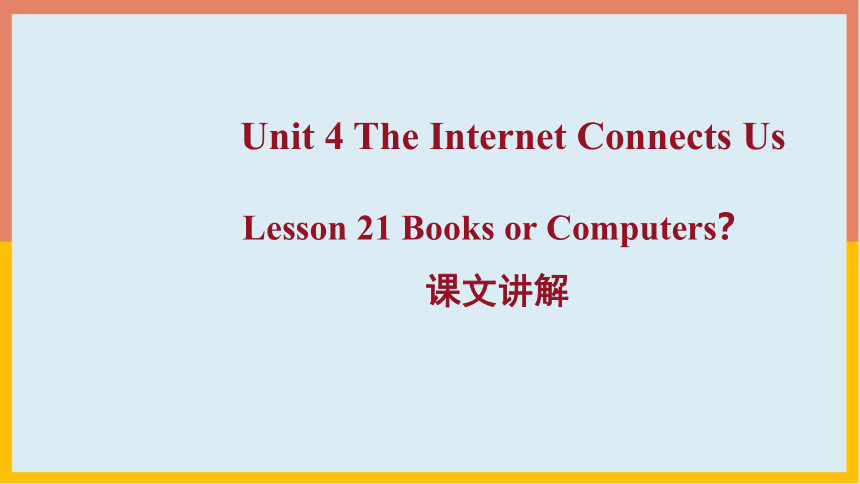 | |
| 格式 | pptx | ||
| 文件大小 | 1.4MB | ||
| 资源类型 | 教案 | ||
| 版本资源 | 冀教版 | ||
| 科目 | 英语 | ||
| 更新时间 | 2022-01-03 18:06:04 | ||
图片预览

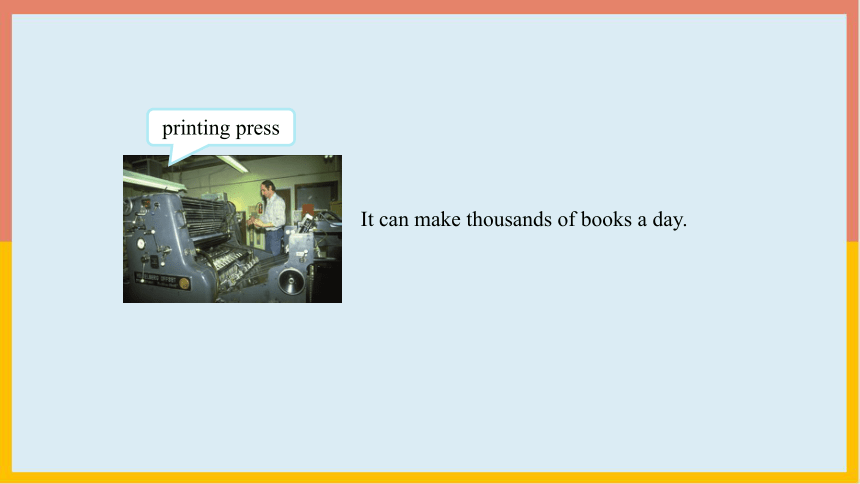
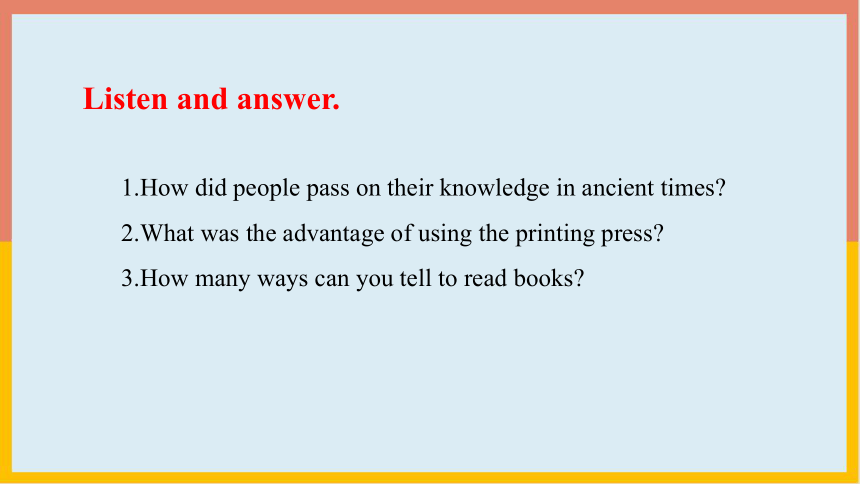
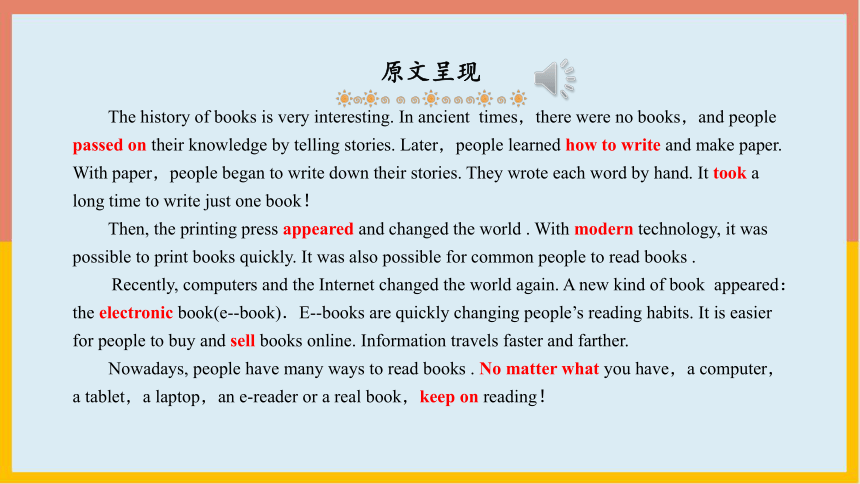
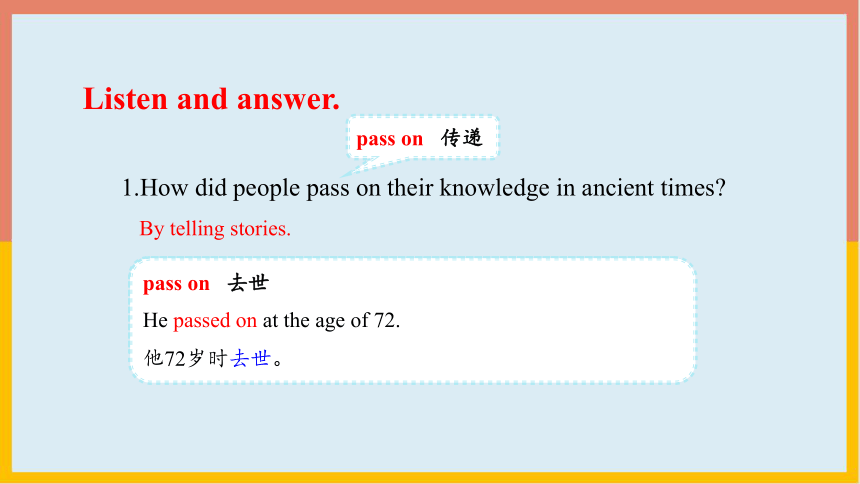
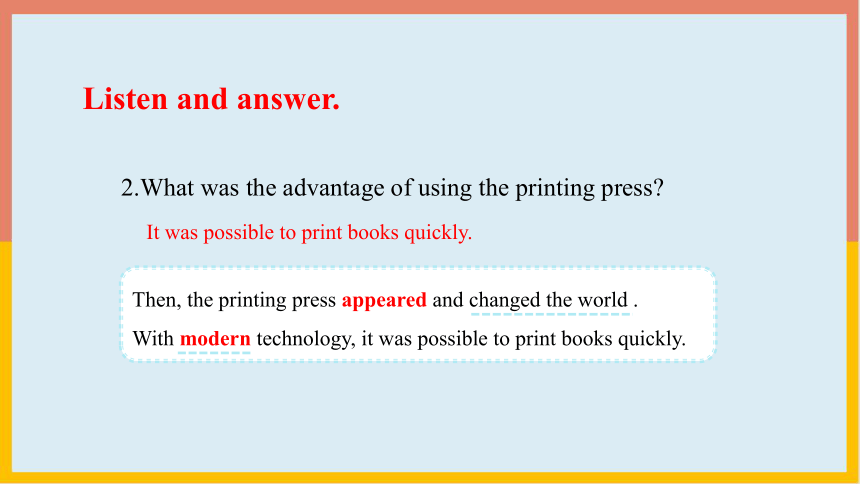
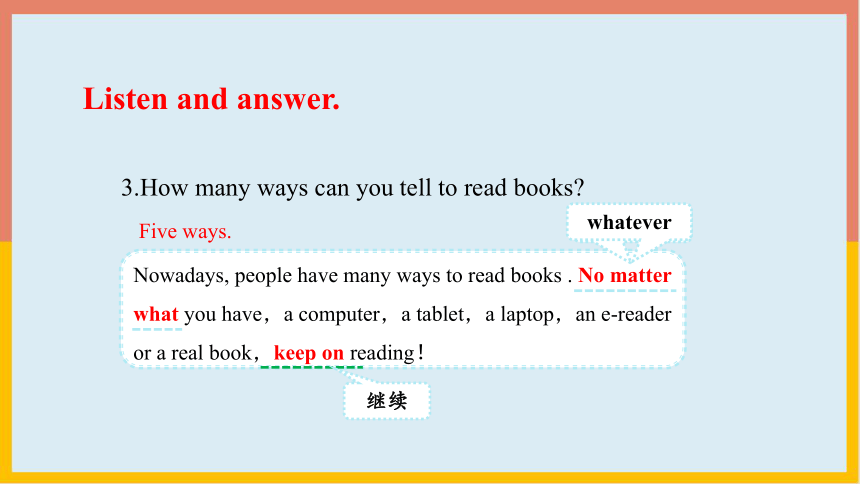
文档简介
(共19张PPT)
Lesson 21 Books or Computers?
课文讲解
Unit 4 The Internet Connects Us
It can make thousands of books a day.
printing press
1.How did people pass on their knowledge in ancient times
2.What was the advantage of using the printing press
3.How many ways can you tell to read books
Listen and answer.
The history of books is very interesting. In ancient times,there were no books,and people passed on their knowledge by telling stories. Later,people learned how to write and make paper. With paper,people began to write down their stories. They wrote each word by hand. It took a long time to write just one book!
Then, the printing press appeared and changed the world . With modern technology, it was possible to print books quickly. It was also possible for common people to read books .
Recently, computers and the Internet changed the world again. A new kind of book appeared: the electronic book(e- book).E -books are quickly changing people’s reading habits. It is easier for people to buy and sell books online. Information travels faster and farther.
Nowadays, people have many ways to read books . No matter what you have,a computer,a tablet,a laptop,an e-reader or a real book,keep on reading!
原文呈现
1.How did people pass on their knowledge in ancient times
Listen and answer.
The history of books is very interesting. In ancient times,there were no books,and people passed on their knowledge by telling stories.
By telling stories.
pass on 传递
pass on 去世
He passed on at the age of 72.
他72岁时去世。
2.What was the advantage of using the printing press
Listen and answer.
Then, the printing press appeared and changed the world .
With modern technology, it was possible to print books quickly.
It was possible to print books quickly.
3.How many ways can you tell to read books
Listen and answer.
Nowadays, people have many ways to read books . No matter what you have,a computer,a tablet,a laptop,an e-reader or a real book,keep on reading!
Five ways.
无论什么
whatever
继续
Later,people learned how to write and make paper.
1
怎样书写
特殊疑问词+ 动词不定式
在此结构中, 疑问词可用疑问代词 who、which、what 等和疑问副词when、where、how 等。
e.g.
I want to know how to improve my spoken English.
我想知道怎样提高我的英语口语。
They wrote each word by hand.
他们用手来写每个单词。
2
by hand 用手;手工
e.g.
He moved the huge stone by hand.
他用手移动了那块大石头。
We arranged lead letters by hand before a newspaper was printed.
在报纸印刷以前,过去是用手工排铅字的。
It took a long time to write just one book!
仅仅写一本书就花了很长时间!
3
take /te k/ v. 费时;需要……时间
e.g. It takes me half an hour to go to school every day.
我每天花半个小时去学校。
辨析:cost, spend, take与 pay
拓展
物+ cost+人+金钱
e.g. The ticket cost me ten dollars . 这张票花了我十美元。
人+spend+时间/金钱+on+名词/代词
e.g. I spent all my pocket money on books .
我所有的零花钱都花在书上了。
拓展
It +takes/took+人+时间+to do
e.g. It took me an hour to walk there. 我花了一小时走到那儿。
人+pay+金钱+ for+物
e.g. He paid $5 for that book . 他花了5美元买那本书
Then, the printing press appeared and changed the world.
然后,印刷机出现了并改变了世界。
4
印刷机
press n. 压;按;新闻;出版社
e.g.
He felt the press of modern life. 他感觉到现代生活的压力。
Perhaps we really should be reflecting on another sacred liberty: the freedom of the press.
也许我们真正应该反思的是另一个神圣的自由:新闻自由。
Then, the printing press appeared and changed the world.
然后,印刷机出现了并改变了世界。
4
press v. 压;按
e.g.
Ann pressed a button and the door closed.
安按了一个按钮,门关上了。
Press this button to start the engine.
要开动发动机就按这个按钮。
Then, the printing press appeared and changed the world.
4
disappear vi. 消失 appearance n.出现;露面
e.g. His sudden appearance surprised me .
他的突然出现使我感到惊讶。
e.g. When night falls, stars appear.夜晚来到时星星出现。
appear v.出现;呈现;来到
It is easier for people to buy and sell books online.
人们在网上买书和卖书更容易。
5
sell /sel/ v. 卖;出售(sold/sold)
e.g. I want to sell the car. 我想卖掉这辆小汽车。
sell sb. sth.=sell sth. to sb. 把某物卖给某人
e.g.
He sold the old car to me for 500 yuan.
He sold me the old car for 500 yuan.
他以五百元的价钱把那辆旧的小汽车卖给了我。
sell 的常用短语:
sell well 卖得好;畅销( 不用于被动句)
e.g.
Mo Yan’s works sell well.
莫言的作品很畅销。
拓展
sell out/be sold out 售完
e.g.
I’m sorry. We’ve sold out.
我很抱歉。我们已经卖完了。
Unit 4-Lesson 21课后作业(微课配套)
Bye-bye
Lesson 21 Books or Computers?
课文讲解
Unit 4 The Internet Connects Us
It can make thousands of books a day.
printing press
1.How did people pass on their knowledge in ancient times
2.What was the advantage of using the printing press
3.How many ways can you tell to read books
Listen and answer.
The history of books is very interesting. In ancient times,there were no books,and people passed on their knowledge by telling stories. Later,people learned how to write and make paper. With paper,people began to write down their stories. They wrote each word by hand. It took a long time to write just one book!
Then, the printing press appeared and changed the world . With modern technology, it was possible to print books quickly. It was also possible for common people to read books .
Recently, computers and the Internet changed the world again. A new kind of book appeared: the electronic book(e- book).E -books are quickly changing people’s reading habits. It is easier for people to buy and sell books online. Information travels faster and farther.
Nowadays, people have many ways to read books . No matter what you have,a computer,a tablet,a laptop,an e-reader or a real book,keep on reading!
原文呈现
1.How did people pass on their knowledge in ancient times
Listen and answer.
The history of books is very interesting. In ancient times,there were no books,and people passed on their knowledge by telling stories.
By telling stories.
pass on 传递
pass on 去世
He passed on at the age of 72.
他72岁时去世。
2.What was the advantage of using the printing press
Listen and answer.
Then, the printing press appeared and changed the world .
With modern technology, it was possible to print books quickly.
It was possible to print books quickly.
3.How many ways can you tell to read books
Listen and answer.
Nowadays, people have many ways to read books . No matter what you have,a computer,a tablet,a laptop,an e-reader or a real book,keep on reading!
Five ways.
无论什么
whatever
继续
Later,people learned how to write and make paper.
1
怎样书写
特殊疑问词+ 动词不定式
在此结构中, 疑问词可用疑问代词 who、which、what 等和疑问副词when、where、how 等。
e.g.
I want to know how to improve my spoken English.
我想知道怎样提高我的英语口语。
They wrote each word by hand.
他们用手来写每个单词。
2
by hand 用手;手工
e.g.
He moved the huge stone by hand.
他用手移动了那块大石头。
We arranged lead letters by hand before a newspaper was printed.
在报纸印刷以前,过去是用手工排铅字的。
It took a long time to write just one book!
仅仅写一本书就花了很长时间!
3
take /te k/ v. 费时;需要……时间
e.g. It takes me half an hour to go to school every day.
我每天花半个小时去学校。
辨析:cost, spend, take与 pay
拓展
物+ cost+人+金钱
e.g. The ticket cost me ten dollars . 这张票花了我十美元。
人+spend+时间/金钱+on+名词/代词
e.g. I spent all my pocket money on books .
我所有的零花钱都花在书上了。
拓展
It +takes/took+人+时间+to do
e.g. It took me an hour to walk there. 我花了一小时走到那儿。
人+pay+金钱+ for+物
e.g. He paid $5 for that book . 他花了5美元买那本书
Then, the printing press appeared and changed the world.
然后,印刷机出现了并改变了世界。
4
印刷机
press n. 压;按;新闻;出版社
e.g.
He felt the press of modern life. 他感觉到现代生活的压力。
Perhaps we really should be reflecting on another sacred liberty: the freedom of the press.
也许我们真正应该反思的是另一个神圣的自由:新闻自由。
Then, the printing press appeared and changed the world.
然后,印刷机出现了并改变了世界。
4
press v. 压;按
e.g.
Ann pressed a button and the door closed.
安按了一个按钮,门关上了。
Press this button to start the engine.
要开动发动机就按这个按钮。
Then, the printing press appeared and changed the world.
4
disappear vi. 消失 appearance n.出现;露面
e.g. His sudden appearance surprised me .
他的突然出现使我感到惊讶。
e.g. When night falls, stars appear.夜晚来到时星星出现。
appear v.出现;呈现;来到
It is easier for people to buy and sell books online.
人们在网上买书和卖书更容易。
5
sell /sel/ v. 卖;出售(sold/sold)
e.g. I want to sell the car. 我想卖掉这辆小汽车。
sell sb. sth.=sell sth. to sb. 把某物卖给某人
e.g.
He sold the old car to me for 500 yuan.
He sold me the old car for 500 yuan.
他以五百元的价钱把那辆旧的小汽车卖给了我。
sell 的常用短语:
sell well 卖得好;畅销( 不用于被动句)
e.g.
Mo Yan’s works sell well.
莫言的作品很畅销。
拓展
sell out/be sold out 售完
e.g.
I’m sorry. We’ve sold out.
我很抱歉。我们已经卖完了。
Unit 4-Lesson 21课后作业(微课配套)
Bye-bye
同课章节目录
- Unit 1 Spring Is Coming
- Lesson 1 How's the weather?
- Lesson 2 It's Getting Warmer!
- Lesson 3 Sun Is Rising
- Lesson 4 The Spring City
- Lesson 5 Babysitting on a Spring Day
- Lesson 6 Stories about Spring
- Unit 2 Plant a Plant
- Lesson 7 Planting Trees
- Lesson 8 Why Are Plants Important?
- Lesson 9 Gardening with Mary
- Lesson 10 Make Your Garden Grow!
- Lesson 11 Amazing Plants
- Lesson 12 Danny's Plant
- Unit 3 Animals Are Our Friends
- Lesson 13 Danny's Big Scare
- Lesson 14 Amazing Animals
- Lesson 15 The Zoo Is Open
- Lesson 16 The Pear Escaped
- Lesson 17 Save the Tigers
- Lesson 18 Friendship Between Animals
- Unit 4 The Internet Connects Us
- Lesson 19 How Do You Use the Internet?
- Lesson 20 A Computer Helps!
- Lesson 21 Books or Computers?
- Lesson 22 Travel on the Internet
- Lesson 23 The Internet--Good or Bad?
- Lesson 24 An E-mail to Grandpa
- Unit 5 Buying and Selling
- Lesson 25 Raising Money
- Lesson 26 Cookies, Please!
- Lesson 27 Business English
- Lesson 28 Ms. Liu's Great Idea
- Lesson 29 How to Push a Product
- Lesson 30 A Cookie Sale
- Unit 6 Be a Champion!
- Lesson 31 Don't Fall, Danny
- Lesson 32 My Favourite Record
- Lesson 33 2800 Years of Sports
- Lesson 34 Modern Olympics
- Lesson 35 The Dream Team
- Lesson 36 Classroom Olympics
- Unit 7 Know Our World
- Lesson 37 Let's Learn Geography!
- Lesson 38 The World Is a Big Place
- Lesson 39 Ring Up or Call?
- Lesson 40 Body Language
- Lesson 41 A Class of the World
- Lesson 42 North America
- Unit 8 Save Our World
- Lesson 43 Let's Clean Up!
- Lesson 44 Environment Clubs
- Lesson 45 Let's Sort Garbage!
- Lesson 46 Protect Our Environment
- Lesson 47 Connected to Nature
- Lesson 48 Garbage Is Interesting!
